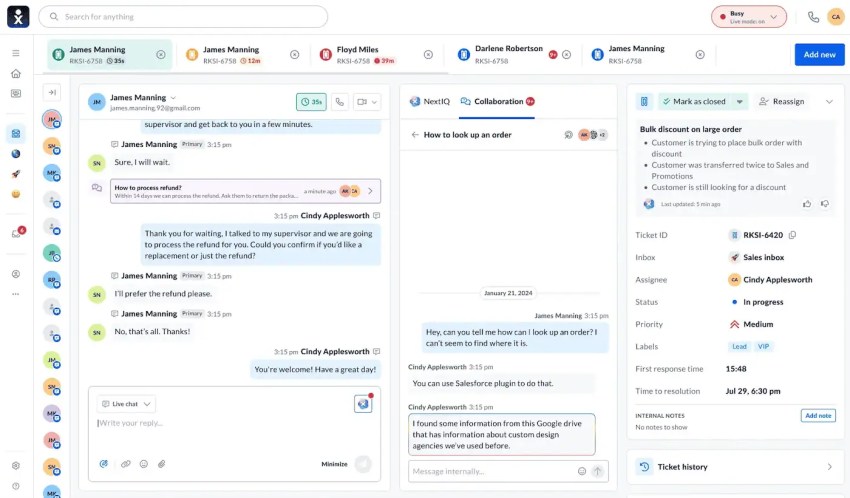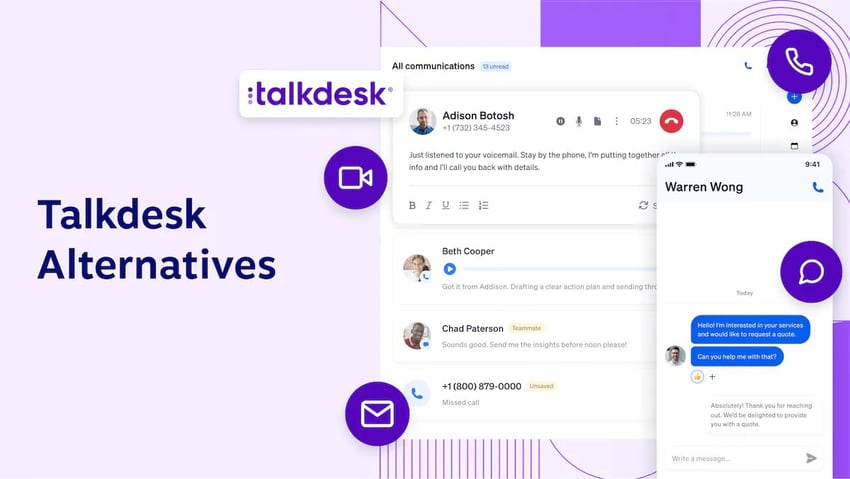Business operations rely heavily on a strong communication technology system, so picking the right telephony solution is crucial to success. That’s where Avaya comes under scrutiny. Once synonymous with reliability and scale, Avaya now faces the tough challenge of transitioning from a decades-old infrastructure and diving headfirst into a cloud-first industry.
The company showcases its technical depth and strategic challenge with both legacy on-prem platforms, like Avaya Aura, and newer cloud offerings, like Avaya Cloud Office. A report from CX Today shows that Avaya has gone through major layoff rounds, including a 30% workforce reduction at its India Global Capability Center. These struggles signal how Avaya is grappling with modernizing its systems.
This deep dive into Avaya reviews explores how the brand’s traditional systems and cloud products are actually performing for customers. You’ll see what real users say about reliability, support, and modernization. You’ll also discover how Nextiva offers a simpler, unified alternative for teams seeking transparency, stability, and growth without legacy overhead.
What Is Avaya and How Does It Work?
Avaya is a legacy telecommunications company that’s been around for decades. It built its reputation on enterprise-grade phone systems, private branch exchange infrastructure, and on-prem contact centers.

Platform overview
Avaya serves thousands of customers across the globe, providing business communication systems for contact centers, collaboration, and unified communications. The company offers long-trusted on-prem systems, like Communication Manager and Avaya IP Office, alongside cloud-first tools under the Avaya Experience Platform (AXP).
With its cloud capabilities, AXP combines voice, chat, and email capabilities with limited artificial intelligence-powered automation, such as speech analytics and routing assistance. The platform integrates with major customer relationship management (CRM) and enterprise software, including Salesforce, Microsoft Dynamics 365, ServiceNow, and Verint, supporting workforce engagement management and detailed reporting workflows.
Compared to fully cloud-native vendors, Avaya’s overall adoption of cloud and AI features has been slower.
Common use cases
Avaya is widely used by companies across the United States, with 6sense noting over 25,000 current customers. Here are the most common use cases:
- Hybrid deployments: Many large enterprises retain stable Avaya on-prem systems while piloting AXP for chat, email, or SMS, an approach Avaya calls “innovation without disruption.”
- High-volume voice environments: Avaya’s Call Management System (CMS) remains a backbone for IVR design, queue analytics, and detailed call metrics in environments that primarily process voice traffic.
- Regulated industries: For sectors that handle sensitive data or financial transactions, Avaya’s platforms offer audit trails, call recording, and security guardrails that support compliance regimes like Payment Card Industry Data Security Standard (PCI DSS) and Health Insurance Portability and Accountability Act (HIPAA).
What Reviews Tell Us About Avaya Features
While Avaya is a global name, only customer reviews can verify its efficiency and effectiveness as a telephony solution. Here are in-depth reviews of its key features, supplemented with customer feedback we’ve gathered.
Reliability and call quality
While Avaya’s cloud platform (AXP) is noted for voice clarity, users still report latency, dropped calls, and headset detection bugs that surface. This inconsistency is a common theme, as its legacy on-prem systems are praised as highly stable with minimal downtime. The challenge for users is that this long-standing reliability doesn’t always translate to Avaya’s newer cloud offerings.

The platform’s strength remains in its traditional reporting; users still highlight Avaya for its strong real-time and historical reporting, which helps track call performance and service levels.
Features and customization
A common complaint is that the platform has been slow to evolve toward newer cloud and AI-driven technologies. This legacy complexity means that configuring APIs and SDKs often requires technical expertise and support from Avaya’s team.
While Avaya delivers mature telephony staples (like IVR, ACD, warm transfers, and conferencing) and a robust integration stack (with native connectors for Salesforce, Dynamics, and Verint), getting them to work requires specialized developer resources, undermining the agility of a modern cloud platform.

Performance and user experience
Avaya users describe the interface as outdated or unintuitive, especially in older modules or overlays. Agents often report a steep learning curve with the platform. It’s tricky to go about manual tasks, switch between consoles, and process awkward flows. Some newer cloud interfaces in Avaya’s portfolio show usability gains. However, the overall user review rating indicates that it still lags behind modern players, like Nextiva or Genesys, in speed, clarity, and minimalism.

Customer support
Feedback on Avaya’s technical support team is polarized. While certain customers praise Avaya’s technician expertise, several reviews cite slow response times, unresolved tickets, and poor escalation paths.
One Reddit thread captures this frustration, with the user saying, “It’s totally infuriating that we have to do the crappy certification every two years to be able to open tickets and then we get this bad of support.” In the same thread, some users report that service quality varies by region, creating challenges for global teams.

Pricing, Contracts, and Cost Fit
Reviews indicate that Avaya is pricier compared to alternatives, especially for midmarket and enterprise tiers. The price ranges from $25 to $40 per user per month, with add-ons available for access to more robust Avaya features. Long-term contracts are standard, which can make scaling or switching providers less flexible.
Several also express frustrations over rising renewal costs. Reddit users connect these increases to the company’s financial troubles, citing concerns about whether continued investment in the product is sustainable. One user says that, for its pricing, it’s not as seamless as needed. It requires multiple servers to accommodate different applications.

Administration, Deployment, and Scalability
On-prem Avaya systems demand considerable IT bandwidth. They also require skilled network engineering, telephony staff, patching, hardware maintenance, and careful change management. Smaller or lean teams often struggle under the burden.
Deploying AXP tends to be smoother in comparison, with features like cloud provisioning, auto-updates, and elastic scaling. However, reviewers sometimes point out gaps in documentation and version parity between modules.
For very large enterprises, Avaya scales well when engineered properly, but mid-market organizations may find the platform overengineered. It may have too many layers, licensed tiers, and architectural overhead for their needs, especially when parts are continuously and quickly moving.
Hybrid deployments also add a challenging layer. IT teams must manage routing coherence, data sync, and telemetry across cloud and legacy systems, which is a significant operational tax that many buyers underestimate.

Security and Compliance
Avaya has long been trusted in regulated verticals (from banking to government), but this trust is built on an on-premise security model that places a heavy burden on internal IT teams. Its systems support robust voice and contact trace records, encryption, and voicemail management, but these often require skilled staff for configuration, patching, and change management to remain compliant.
While Avaya is advancing its cloud security frameworks, its hybrid model creates a complex challenge. Teams are left managing two separate security postures, whereas modern, cloud-native rivals provide unified, automated compliance and threat protection without the overhead.
Who Avaya Is Best For
Avaya may still be a fit for large enterprises that are locked into its ecosystem and want to maximize sunk costs before making a full transition to the cloud. It also suits IT departments with deep, legacy telephony experience and the engineering resources capable of managing hybrid deployments and handling complex administrative layers without needing vendor-side assistance for every update or configuration.
Who Should Consider Alternatives?
If your team wants a modern, cloud-first platform with minimal admin burden and fast onboarding, Avaya’s legacy complexity may slow you down. Companies prioritizing AI automation, omnichannel routing, and a clean UX will likely find Avaya trails behind newer contact-center-as-a-service (CCaaS) vendors in agility.
Mid-market organizations without large IT or telecom teams often struggle under Avaya’s steep admin load. They’re better served by vendors that absorb implementation and support complexity almost instantly.
Investors and buyers eyeing platform stability are also raising red flags. As Databird Business Journal writes, recent workforce reductions at Avaya have sparked questions about the company’s ability to maintain service quality and innovation, prompting some customers to explore alternative providers proactively.
Best Alternative to Avaya
What is the top Avaya alternative you should explore?
Nextiva (best all-in-one alternative)

Nextiva stands out as a comprehensive, cloud-native alternative that merges unified communications as a service (UCaaS), CCaaS, and CRM into a single platform. It’s designed for teams that want full-scale functionality without the headaches of multiple admin consoles or costly add-ons. Users consistently highlight its user-friendly interface and short onboarding times, which help reduce training overheads compared to legacy systems.
Advanced AI capabilities, such as real-time transcription, action item detection, and sentiment analysis, make it ideal for organizations embracing automation to improve efficiency.
Nextiva also wins points for transparency and value — key Avaya weak spots. While Avaya AXP requires a quote for plan comparisons, Nextiva publishes an entry CCaaS price on its site, which simplifies budgeting. This flexibility extends to procurement, where Nextiva offers per-user, concurrent, and usage-based options on one page, giving procurement multiple purchasing paths up front.
Nextiva’s enterprise catalog also highlights PCI DSS secure payment assist and predictive outbound, which can reduce the need for separate add-ons, reinforcing its all-in-one value. This is all backed by 99.999% uptime and award-winning, 24/7 human support.
For teams tired of managing complexity or chasing support tickets, Nextiva offers a cleaner, more sustainable upgrade path. The unified communications platform delivers the enterprise performance that Avaya once pioneered, without the operational friction.
| Feature | Nextiva CCaaS | Avaya Experience Platform |
|---|---|---|
| Entry list price | From $75 per user per month on Essential | Not published on the official site. Quote required |
| Omnichannel | Voice and digital channels | Voice, email, messaging, and chat with API first design |
| Real-time AI | Transcription, summaries, and AI assist noted | Speech transcription, PII redaction bot, wrap-up bot, virtual agents |
| Supervisor views | Dashboards, wallboards, real-time, and historical analytics | Experience Management dashboards and reporting |
| WEM and QM | WFM at Premium tier | WEM options are commonly paired with Verint |
| Outbound | Predictive and progressive dialers | Proactive outreach capabilities |
| Compliance and SLA | PCI assist highlighted and enterprise posture | SLA document and Trust Center, and service compliance status |
| Status page | Public status resources | Public status site |
Summarizing the Review: Pros and Cons of Avaya
Is Avaya right for you? Here’s a summary of its pros and cons:
Pros
- Stable on-premise hardware: Avaya’s legacy systems are time-tested and known for reliability in traditional voice environments.
- Strong compliance for regulated industries: Avaya has a deep footprint in banking and government, with strong auditing and recording features for its on-premise systems.
Cons
- Outdated user interface: Users consistently describe the UI as clunky, unintuitive, and visually dated, with a steep learning curve for new agents.
- High cost of ownership: Multiple Avaya reviews cite expensive licensing structures and escalating support contracts as pain points, especially for long-term renewals.
- Inconsistent support: User reports highlight slow response times and poor escalation management, leading to prolonged downtime.
- Cloud immaturity: Avaya Experience Platform remains behind cloud-native competitors, like Genesys Cloud CX and Nextiva, in AI, omnichannel orchestration, and ease of administration.
- Financial instability: Repeated layoffs and restructuring have raised legitimate concerns about Avaya’s long-term stability
Buyer Checklist and Evaluation Questions
Before committing, enterprise buyers should weigh both operational capability and vendor viability.
Ask yourself:
- What percentage of our workforce truly needs on-prem versus cloud functionality? Many Avaya customers maintain on-prem infrastructure because of sunk costs, not necessity. Conduct a workload audit. If fewer than 40% of your agents rely on hardware-dependent voice systems, migrating to a unified cloud environment may deliver faster ROI and lower maintenance risk.
- Do we have the internal IT expertise to manage Avaya’s configuration, patching, and integration complexity? Avaya’s hybrid and legacy systems often require certified engineers and telephony specialists. If your IT team already manages multiple SaaS platforms or VoIP networks, layering in Avaya’s unique administration model could stretch your resources thin.
- Are Avaya’s robust reporting features worth the usability trade-offs for frontline teams? While Avaya CMS provides powerful data granularity, it can also create operational drag for non-technical users. Evaluate whether your supervisors need advanced query depth — or if a more visual, real-time dashboard (like Nextiva’s) better suits your day-to-day agility.
- What is our tolerance for vendor risk, given Avaya’s financial history and recent layoffs? Avaya’s restructuring has raised valid concerns about roadmap execution, particularly for cloud innovation and customer support continuity. Risk-conscious buyers should verify product sunset timelines, roadmap stability, and contract exit terms before committing.
What Our Analysis of Avaya Reviews Adds Up To
Avaya remains a respected name in enterprise communications, particularly among organizations deeply invested in its infrastructure. Its reliability, compliance pedigree, and legacy features still serve high-volume, regulated environments well.
However, recent user reviews reveal a growing gap between Avaya’s traditional strengths and the evolving expectations of modern operations that provide stellar customer experience. Companies today need call center systems that are agile, AI-ready, and cloud-native, which are qualities where Avaya’s transformation remains incomplete.
For businesses seeking simplicity, innovation, and dependability, Nextiva represents the pragmatic alternative. It delivers UCaaS, CCaaS, and CRM in one intuitive platform with transparent pricing, 99.999% uptime, and 24/7 human support.
In 2026 and beyond, organizations that want to grow without complexity will increasingly migrate toward a unified, cloud-based communications solution. Right now, Nextiva leads that conversation.
Start modernizing your contact center today. See why thousands of teams trust Nextiva to simplify communication, strengthen resilience, and turn every customer interaction into a growth opportunity.
Explore Nextiva’s all-in-one communication platform.
Get the best business phone service for less.
A powerful phone service with voice, SMS, and video conferencing built in. Take calls on the business communication channels you prefer.

















 VoIP
VoIP 









